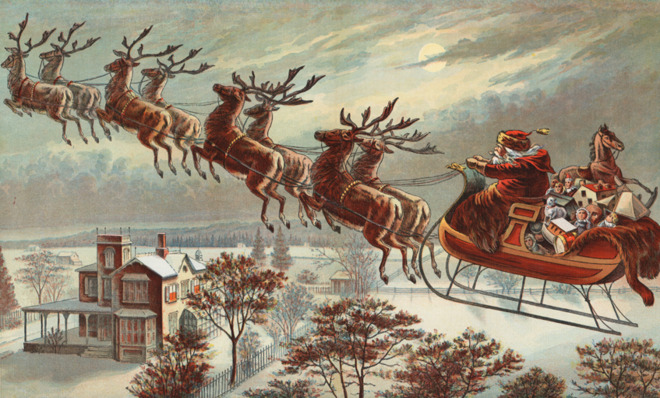'Tis and 10 other fun proclitic words


A free daily email with the biggest news stories of the day – and the best features from TheWeek.com
You are now subscribed
Your newsletter sign-up was successful
English likes to stick contractions on the end of words. "They have" becomes "they've," "I will" becomes "I'll," and "do not" becomes "don't." The shortened parts of these words are called enclitics — they are a bit more independent than suffixes, but like suffixes, they attach to the ends of words. English also used to have a number of proclitics — shortened words that attach to the beginning of other words. Most proclitic words are now archaic or obsolete, but every December the neglected proclitics get their revenge, as a holiday avalanche of "'tis" rolls through town.
'Tis, a shortening of "it is," has a Dickensian, Christmasy ring to it. For a time, it was far more common in writing than its counterpart "it's." The final shift from "'tis" to "it's" took place in the middle of the 19th century, when Dickens was writing his novels. That was also when the lyrics to "Deck the Halls" were first published. "'Tis the season" is now so deeply embedded in our linguistic consciousness that the perfectly normal phrase "it's the season" just sounds weird, like Mick Jagger singing "I can't get any satisfaction."
Why let 'tis have all the fun? This season, get in the proclitic spirit with these 10 other charming word-beginning contractions.
The Week
Escape your echo chamber. Get the facts behind the news, plus analysis from multiple perspectives.

Sign up for The Week's Free Newsletters
From our morning news briefing to a weekly Good News Newsletter, get the best of The Week delivered directly to your inbox.
From our morning news briefing to a weekly Good News Newsletter, get the best of The Week delivered directly to your inbox.
1. 'TWAS
This is another one that contributes to the Christmasy overtones of these words, due to its association with "'Twas the Night Before Christmas."
2. 'TWERE
This poor guy is doubly archaic. Not only does it contain the contracted "it," but also the subjunctive "were." If the subjunctive was still commonly used — I mean, if 'twere commonly used — we might hope for a 'twere revival. But probably not.
A free daily email with the biggest news stories of the day – and the best features from TheWeek.com
3. 'TWOULD
The t sound doesn't attach so well to the beginning of could or should, but it has no problem forming a cluster with the w of would.
4. 'TWILL
'Tis, 'twas, and ever 'twill be.
5. 'TWON'T
Nothing stopping a word from contracting on both ends. 'Twon't gets "it will not" into one syllable.
6. 'TAIN'T
Some prefer 'tisn't, but if you prefer 'tain't, 'tain't nobody's business if you do.
7. TH'ART
"It" isn't the only word that can turn proclitic. "Thou" can also reduce and join to its verb. Shakespeare did it. Th'art impressed, I bet.
8. N'ART
Chaucer did it with the negation particle "ne." If thou n'art impressed now, I don't know what to tell you.
9. 'SWONDERFUL
You can even take an enclitic, the s of "it's," and turn it into a proclitic, Gershwin style: 'swonderful, 'smarvelous, 'sawful nice, 'sparadise, and so on until 'sdone.
10. Y'ALL
This one may not call to mind Dickens, Shakespeare, Chaucer, or even Gershwin, but it can still help you get in a holiday mood. 'Tis the season, y'all.
Arika Okrent is editor-at-large at TheWeek.com and a frequent contributor to Mental Floss. She is the author of In the Land of Invented Languages, a history of the attempt to build a better language. She holds a doctorate in linguistics and a first-level certification in Klingon. Follow her on Twitter.
-
 Political cartoons for February 15
Political cartoons for February 15Cartoons Sunday's political cartoons include political ventriloquism, Europe in the middle, and more
-
 The broken water companies failing England and Wales
The broken water companies failing England and WalesExplainer With rising bills, deteriorating river health and a lack of investment, regulators face an uphill battle to stabilise the industry
-
 A thrilling foodie city in northern Japan
A thrilling foodie city in northern JapanThe Week Recommends The food scene here is ‘unspoilt’ and ‘fun’
